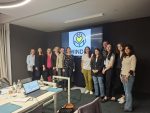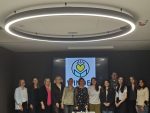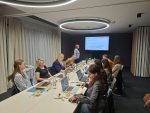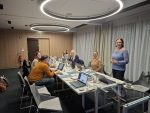WINDEE Project meeting in Ljubljana
![]()
On September 24–25, a meeting of partners in the international project Well-being in Digital Education Ecosystem (WINDEE), coordinated by the Institute of Innovative Studies at Vytautas Magnus University, took place in Ljubljana.
During the meeting, project partners from various European countries and institutions discussed the project’s progress, the achieved results, and the next steps. At the centre of the discussions was the project’s key theme: the well-being of students and teachers in digital education.
The project began with extensive evidence gathering aimed at identifying the main factors shaping teachers’ and learners’ experiences in digital learning environments. A systematic literature review was conducted, along with a policy mapping report on existing European and national-level policies related to digital well-being in education, highlighting gaps, opportunities, and best practices to inform future policy development and implementation strategies. In addition, project researchers analysed more than 100 digital tools and technologies used in education and their potential impact on learners’ digital well-being. The results form a strong foundation for further project activities and the next stage – the development of a Digital Well-being Framework.
At the Ljubljana meeting, participants discussed the key components of digital well-being in education at both the classroom and school levels. Partners shared experiences, insights, and practical examples on how to ensure responsible use of technology and create a digital environment conducive to learning. Meeting participants also focused on designing a concept for identifying good practices, as well as collecting and describing case studies. All of this will contribute to the creation of the Digital Well-being Framework.
The Digital Well-being Framework is one of the most important outcomes of the project. It will present principles, strategies, and guidelines for responsible use of technology, helping teachers and educational institutions make appropriate choices when integrating technologies into the teaching and learning process. It will be tested in real educational environments through experiments, analysis of their results, and evaluation of their practical impact.
The outcomes of this meeting not only strengthened collaboration among project partners but also paved the way for the further development of the WINDEE project, which will contribute to higher-quality, more balanced, and well-being-oriented digital education in Europe.
DISCLAIMER: “Funded by the European Union. Views and opinions expressed are however those of the author(s) only and do not necessarily reflect those of the European Union or the European Education and Culture Executive Agency (EACEA). Neither the European Union nor EACEA can be held responsible for them.”













